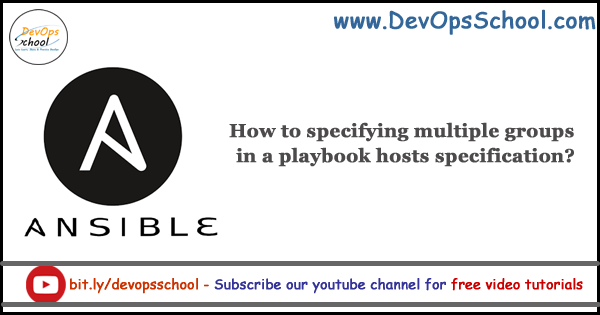
By design, Ansible executes just one play at a time. Your playbook consists of two plays (the two items in the root-level YAML list defined by the playbook file).
Method 1
The following patterns address one or more groups. Groups separated by a colon indicate an “OR” configuration. This means the host may be in either one group or the other:
---
- name: This sets up an httpd webserver
hosts: web:db
tasks:
- name: Install the httpd apps
yum: name=httpd
- name: start the httpd service
service: name=httpd state=started
- debug:
msg: System {{ myname }} has uuid {{ ansible_product_uuid }}
- debug: msg="System {{ myname }} has uuid {{ ansible_product_uuid }}"
Code language: JavaScript (javascript)Method 2
You can exclude groups as well, for instance, all machines must be in the group webservers but not in the group phoenix:
---
- name: This sets up an httpd webserver
hosts: webservers:!phoenix
tasks:
- name: Install the httpd apps
yum: name=httpd
- name: start the httpd service
service: name=httpd state=started
- debug:
msg: System {{ myname }} has uuid {{ ansible_product_uuid }}
- debug: msg="System {{ myname }} has uuid {{ ansible_product_uuid }}"
Code language: JavaScript (javascript)Method 3
You can also specify the intersection of two groups. This would mean the hosts must be in the group webservers and the host must also be in the group staging:
---
- name: This sets up an httpd webserver
hosts: webservers:&staging
tasks:
- name: Install the httpd apps
yum: name=httpd
- name: start the httpd service
service: name=httpd state=started
- debug:
msg: System {{ myname }} has uuid {{ ansible_product_uuid }}
- debug: msg="System {{ myname }} has uuid {{ ansible_product_uuid }}"Code language: JavaScript (javascript)Method 4
You can also specify the intersection of two groups. This would mean the hosts must be in the group webservers and the host must also be in the group staging: The below configuration means “all machines in the groups ‘webservers’ and ‘dbservers’ are to be managed if they are in the group ‘staging’ also, but the machines are not to be managed if they are in the group ‘phoenix’ … whew!
---
- name: This sets up an httpd webserver
hosts: webservers:dbservers:&staging:!phoenix
tasks:
- name: Install the httpd apps
yum: name=httpd
- name: start the httpd service
service: name=httpd state=started
- debug:
msg: System {{ myname }} has uuid {{ ansible_product_uuid }}
- debug: msg="System {{ myname }} has uuid {{ ansible_product_uuid }}"Code language: JavaScript (javascript)Method 5
You can also use variables if you want to pass some group specifiers via the “-e” argument to ansible-playbook, but this is uncommonly used:
---
- name: This sets up an httpd webserver
hosts: webservers:!{{excluded}}:&{{required}}
tasks:
- name: Install the httpd apps
yum: name=httpd
- name: start the httpd service
service: name=httpd state=started
- debug:
msg: System {{ myname }} has uuid {{ ansible_product_uuid }}
- debug: msg="System {{ myname }} has uuid {{ ansible_product_uuid }}"
Code language: JavaScript (javascript)Reference
https://docs.ansible.com/ansible/latest/user_guide/intro_patterns.html
I’m a DevOps/SRE/DevSecOps/Cloud Expert passionate about sharing knowledge and experiences. I have worked at Cotocus. I share tech blog at DevOps School, travel stories at Holiday Landmark, stock market tips at Stocks Mantra, health and fitness guidance at My Medic Plus, product reviews at TrueReviewNow , and SEO strategies at Wizbrand.
Do you want to learn Quantum Computing?
Please find my social handles as below;
Rajesh Kumar Personal Website
Rajesh Kumar at YOUTUBE
Rajesh Kumar at INSTAGRAM
Rajesh Kumar at X
Rajesh Kumar at FACEBOOK
Rajesh Kumar at LINKEDIN
Rajesh Kumar at WIZBRAND
Find Trusted Cardiac Hospitals
Compare heart hospitals by city and services — all in one place.
Explore Hospitals
